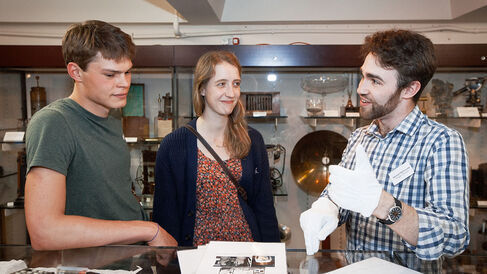Supporting Teaching and Research

The Department of History and Philosophy of Science is unusual in having teaching programmes connected to the Whipple Museum's world-renowned collection of scientific instruments and books. The Museum is regularly used for both undergraduate and graduate teaching at the University of Cambridge and is a centre of research for students and staff.
Working with the collection
Students are actively encouraged to work with objects in the collection and the undergraduate Part II course includes specific object demonstration classes where students can handle and study the instruments. Lectures and demonstration classes are held in the newly refurbished Reserve Gallery, which provides an ideal space for students to sit down with the objects and interact with them.
Students are also encouraged to produce Case Studies that display their current research or areas of interest in the Whipple's Main Gallery. Other museum displays also complement undergraduate lecture courses, showing instruments and books of the variety described in classroom-taught material.
Starry Messenger
The Whipple Museum developed Starry Messenger, an electronic history of astronomy that focuses on the astronomical instruments and practical uses of the subject. The project was directed by Dr Sachiko Kusukawa and Dr Liba Taub, managed by Dr David Chart and supported by Trinity College, Cambridge.
Starry Messenger draws on the rich collection of instruments and books in the Whipple Collection, the Wren Library and the University Library. It aims to make available online some aspects of the early history of astronomy for student use. The project also provided work experience for the postgraduate students who contributed to its construction.
Excellence in Teaching and Research
For integrating the Whipple Collection into teaching, Professor Liba Taub, Director and Curator of the Museum, was awarded a Pilkington Teaching Prize in 1998. These annual prizes are conferred on academic staff to honour excellence in teaching at the University. The following year, Professor Taub was awarded the Joseph H. Hazen Education Prize by the History of Science Society, in recognition of outstanding contributions to the teaching of history of science. She was particularly commended for her innovative use of museum resources in undergraduate and graduate teaching.
Since 2017, the Board of History and Philosophy of Science has awarded the annual Anita McConnell Prize for an outstanding performance on an essay or dissertation that is based on an object in the Whipple Museum's collection.
Museum classes for Part II students
The Part II course includes lecture-demonstration museum classes on instruments, models and collections. Taking place in the relaxed setting of the Reserve Gallery, the classes allow students to study instruments in the collection relating to their lecture courses, including microscopes, globes and surveying equipment. Students can experience for themselves some of the practical problems faced by contemporary practitioners when using instruments.
